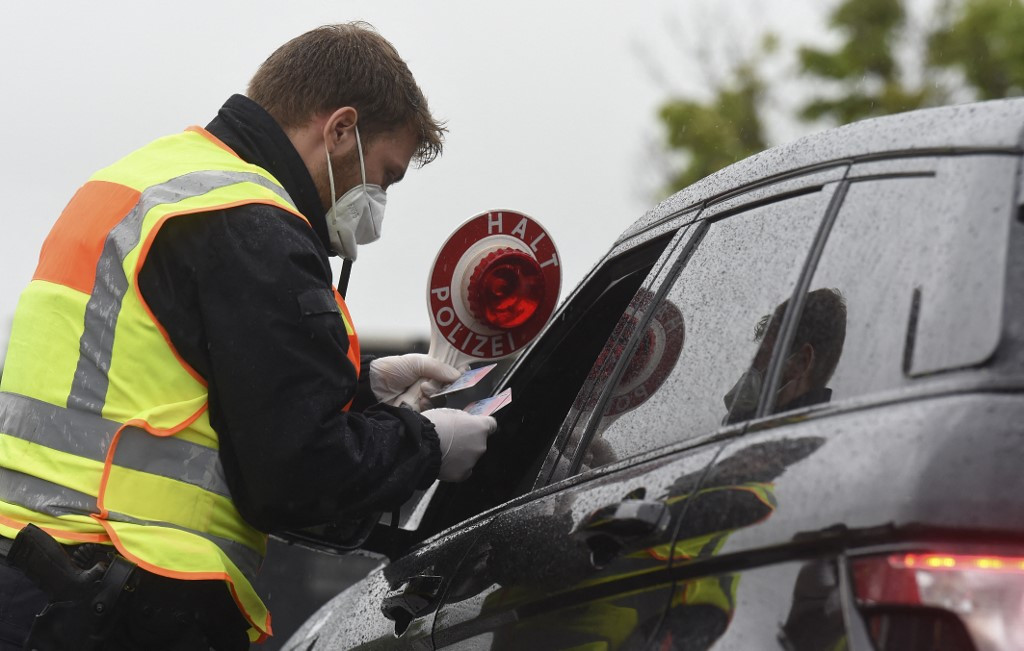Popular Reads
Top Results
Can't find what you're looking for?
View all search resultsPopular Reads
Top Results
Can't find what you're looking for?
View all search resultsGermany plans free antigen tests for all from March
Unlike PCR (polymerase chain reaction) tests that must be analysed in a lab, antigen testing can be done from saliva with a result given on the spot within 30 minutes.
Change text size
Gift Premium Articles
to Anyone
 A German federal police officer wearing a face mask controls a car driver at a chekcpoint of the German federal police at the border crossing between Austria and Germany, near the German village of Kiefersfelden, southern Germany, during a normal migration entry control on June 15, 2020. (AFP/Christof Stache)
A German federal police officer wearing a face mask controls a car driver at a chekcpoint of the German federal police at the border crossing between Austria and Germany, near the German village of Kiefersfelden, southern Germany, during a normal migration entry control on June 15, 2020. (AFP/Christof Stache)
G
ermany is to offer free Covid-19 antigen tests for all from March, Health Minister Jens Spahn said Tuesday, as the country cautiously began allowing some children to return to schools.
"From 1 March, all citizens will be able to be tested free of charge by trained personnel" with the tests, Spahn said in a tweet.
They will be available at pharmacies, doctors' and dentists' offices as well as Covid-19 testing centres, according to the Bild daily.
Unlike PCR (polymerase chain reaction) tests that must be analysed in a lab, antigen testing can be done from saliva with a result given on the spot within 30 minutes.
That makes it easier and faster to test large numbers of people, though antigen tests are less reliable in detecting Covid-19 in people who are not showing symptoms.
Germany is also planning to roll out self-administered antigen tests after their approval by national drug regulator BfArM, which "is expected soon", Spahn added.
Germans will be asked to pay one euro ($1.20) each for the home tests, according to media reports.
Self-administered tests in particular could play an important role as Germany eyes reopening schools and some other facilities after more than three months of closures.
Restaurants and bars, hotels, cultural venues and leisure centres were shuttered in November, followed by schools and non-essential shops in December.
Since then, new Covid-19 cases have dropped considerably and the seven-day incidence rate had fallen to 58.7 on Tuesday, according to the Robert Koch Institute (RKI) health body.
Chancellor Angela Merkel's government agreed last week to continue the partial lockdown until at least March 7, but left it to the country's individual states to decide when to reopen schools.
Hairdressers were also given the green light to reopen from March 1.
Schools in Saxony reopened to some pupils from Monday, with most other states planning to follow suit on February 22.
But concerns about virus variants considered to be more contagious remain high and have led Germany to place Czech border regions as well as Austria's Tyrol on a red list of high-risk zones that includes Britain and South Africa.
The ban on most travel from these risk zones is set to be in place until at least the end of February, according to a report in the weekly Der Spiegel on Tuesday.
Germany on Tuesday recorded 3,856 new cases of Covid-19 in the previous 24 hours and 528 deaths, according to the RKI.









